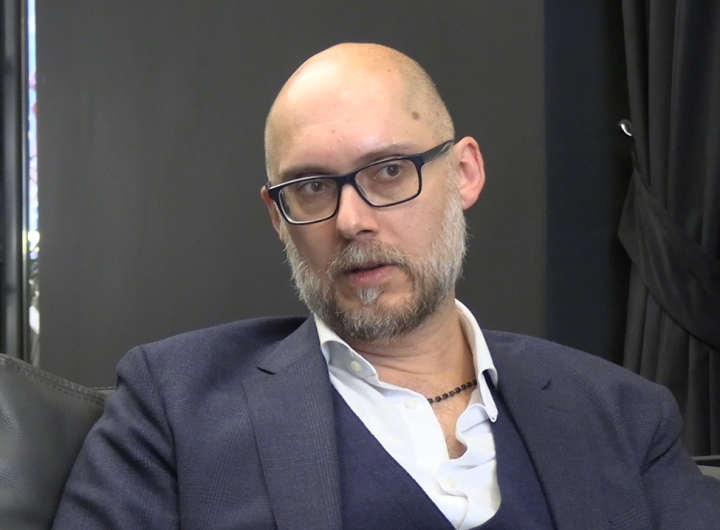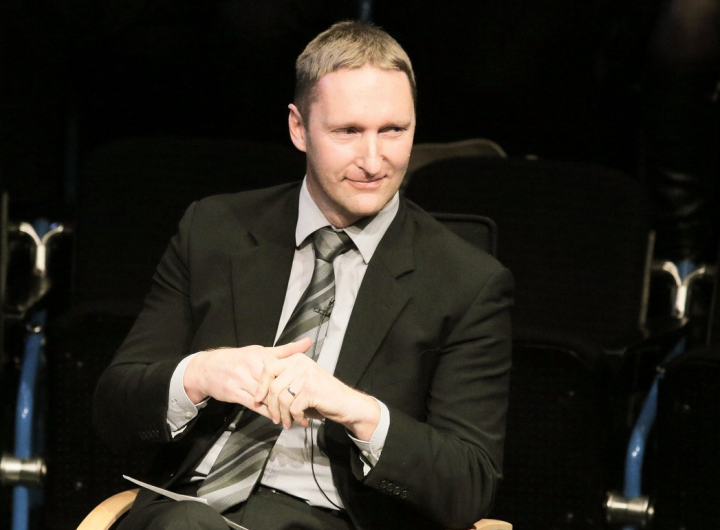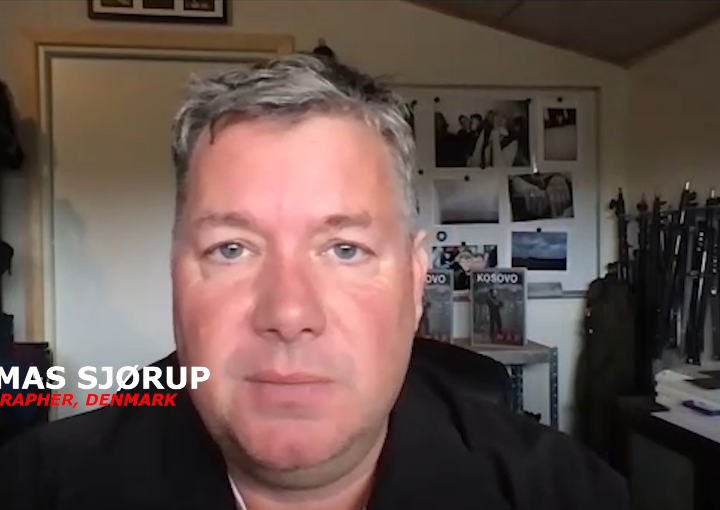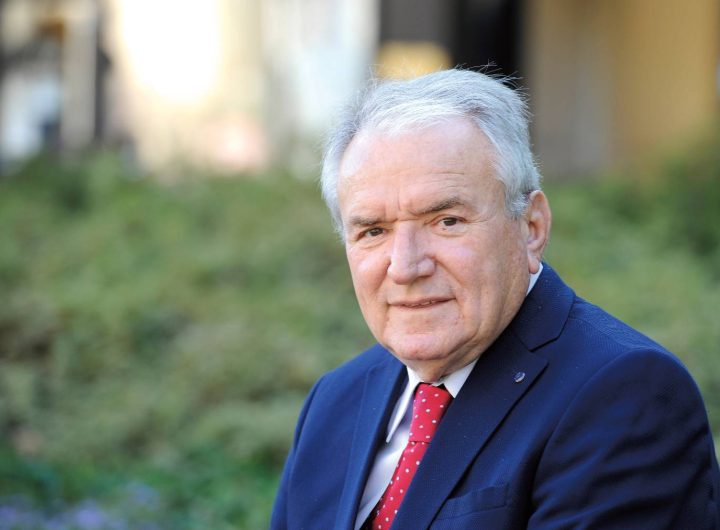
Europe has been slow to act towards the Balkans, an approach that has damaged Kosovo but also the European Union itself. This is what former diplomat Sylë Ukshini says in an interview for The Geopost.
“Serbia will not give up on Russia without giving up its hegemonic stance,” Ukshini emphasizes as he speaks about the Serbian state’s game of two “chairs” between the West and Russia.
While speaking about Russia’s destabilizing role in the region, the influence of the Serbian Orthodox Church in Serbia’s hegemonic projects, and the double game that Belgrade continues to play between the West and the East, he calls for a clearer and more determined approach by the West towards the Balkans and especially towards Serbia. He underlines that without a real confrontation with the past, the region will remain hostage to old hegemonic policies.
Full interview:
Ukshini: There is a professor from Potsdam, not because he said it, but even without saying it, I find it interesting because I often get the impression, even in the analyses that are carried out today, that people take a short-sighted view of things. And he says that you can’t solve some current problems without knowing the developments of the 19th century well. Your question also has this connection. And Russia’s attempt to expand towards Asia and the lost wars with Japan leave Russia with only one solution: to reach the Mediterranean either via the Bosporus or via the Balkans. And since the Ottoman Empire was located on the Bosporus, or rather behind it were the interests of Great Britain itself in the straits, Russia’s focus would be on the Balkans. And the turning point, or the moment when its influence was felt in the Balkans, was undoubtedly the Eastern Crisis of 1875-1878. And this is where Russia began to look for clientele in the Balkans. And one of its most favorable clienteles is Serbia, and through Serbia it tries to reach the Adriatic.
And this is where the idea of territorial expansion arises. And of course Austria-Hungary is also in this game. The point, however, was that at that time, when the European concept and European relations were not yet what they are today, Russia managed to find allies even within the great powers: It found France, it found Great Britain and, based on this premise, was able to realize its interests piece by piece. Even at the St. Stephen’s Conference, the Berlin Congress and then at the London Conference. And it was precisely at the London Conference that the Kosovo issue arose, in which Russia supported Serbia and its territorial claims.
What he did not succeed in doing, however, was gaining Serbian access to the Adriatic, as he encountered strong resistance from Austria-Hungary. The aim was to draw a line through Serbia and thus create a channel for Russian penetration. And I have the impression that they obviously had it here, and it was also the concern of Edward Gray, the Foreign Secretary of Great Britain at the time, who, with his neutral stance, did not support Russia to a certain extent when it was called into the Entente framework, thus preventing Russia from coming out. However, if these problems in the Balkans are a legacy of the 19th and early 20th centuries, they are in fact precisely due to the clientelist and hegemonic position that existed at the time, or the Pan-Slavist idea that was conceived in Moscow and then implemented by Belgrade.
The Geopost: This Pan-Slavic idea was also mentioned during the last visit of Serbian Patriarch Irinej, the meeting with Patriarch Kirill of Moscow and the meeting with Putin. How do you see the influence of the Orthodox Church and to what extent has Russia asserted its influence through the Orthodox Church in the Balkans?
Ukshini: I am sometimes surprised by young European diplomats. They don’t know the role of this part of the Orthodox Church very well. Even within the Ottoman Empire, there was a kind of coalition, a kind of cooperation between the Russian and Serbian Orthodox Church to achieve hegemonic goals, because the Orthodox Church has always identified the national question with the religious question. And even in the wars of the 1990s, the church was at the service of politics. And the same applies to Russia. And under these conditions, even today’s Serbian church, which claims to be seeking new concessions in Kosovo, is not concerned with the question of Serbian rights, but with the dissolution of the state of Kosovo and the realization of the idea of a Greater Serbia. Because, as the Serbian historian Latinka Perovic puts it, the existence of the state of Kosovo is essentially an obstacle to the idea of a Greater Serbia. And in this context, the Serbian church is a powerful instrument or the third instrument alongside the political elites, the third instrument that serves the project of the great state. And so it was during the time of Milosevic and also in earlier periods that nationalist myths and wars or indoctrination, the poisoning of public opinion in Serbia, were permanently carried out by the Serbian churches, which instead of prayers to God and religious services held ideological, political and hegemonic services. And the church is merely a political instrument serving a policy of expansion.
And you saw it in the last statement, the Serbian Patriarch from Kosovo, he talks about untrue things because we also have an international presence here, but at the same time he also talks about Vučić’s messages that Vučić will come and will not listen to Europe.
However, I believe that neither the Serbian church nor Russia alone are to blame. I think that European behavior towards the Balkans was too slow. I have to admit that the European Union has been talking about European integration since the fall of the Berlin Wall 35 years ago. The Cold War lasted 45 years. 35 years is a long time. The European Union has moved at a snail’s pace and created a gap here that Russia has exploited to its advantage. Russia has exploited the same loophole in the case of Kosovo, where some European Union countries have de facto undermined the West’s success in the Balkans and Kosovo through their lack of support for Ahtisaari and independence.
And I often say that this approach by the EU countries has not only harmed Kosovo, but has also damaged the position of the European Union itself. Brussels must actually also be held responsible for this situation that is arising, for this instability, because Brussels has always pursued a clientelist policy in the Balkans and Serbia has not been given any real opportunity to come to terms with the past. And you see, on this basis alone, we are being forced to maintain a church on the university campus inaugurated by Arkan. I have nothing against church buildings, but this is a church of Arkan or Milosevic.
And what does a cult object need on a university campus? And we have never seen the Serbian Church distancing itself, taking a distancing stance against the claim that the church was built without our interest, without a religious mission and with the intention of insulting and ignoring the Albanians.
I think that, as one foreign author says, the Serbian Orthodox Church was also a center of anti-Semitism. And the foundation of the Serbian state and its expansion from the Pashalik in Belgrade were initiated on the following premises: ethnic cleansing, fighting minorities and above all these the Serbian Church was constantly and continuously behind this project, which was of course also supported by the Russian Orthodox Church and Russian political circles in Moscow.
The Geopost: Major changes are currently taking place in the world. Serbia, with its double game towards the West, Russia and China, is sometimes seen positively by the West, but from our perspective it looks different. Where do you see Serbia and the overall Russian influence in the Balkans?
Ukshini: It seems naïve to me to expect Serbia to become pro-Western, because in the foundations of the existence and formation of the Serbian state there were always two currents, between East and West, and they were at permanent war, but were always used here to get privileges and benefits from both the East and the West.
I think Serbia should have the freedom to decide where it wants to go. I regret this demand, but Serbia is exploiting it in the most brutal way. I also looked up a German Foreign Ministry document from the 1990s on how to approach Serbia. It was during the Bosnian war and the occupation of Kosovo.
Even then, the West followed almost the same methodology. We have to bring Serbia closer, because it is an important country in the Balkans, so that it does not pass over to Russia. And you see, three decades later, we are still sticking to this rhetoric. I think the point is that they have to recognize the will of the Albanians to be part of the Euro-Atlantic processes and to integrate. Meanwhile, at the same time, it may become clear to Serbia that you can go there. I think that by offering a clear Euro-Atlantic perspective for Kosovo, Serbia will get a stronger signal that countries that choose this path can make progress. However, if opens Serbia one chapter after another without any commitment and at the same time imposes sanctions on the victims, such as Kosovo, this does not contribute to it pursuing a policy of pragmatism towards the West.
Everything that followed was, in my opinion, patronage politics and a policy that played the political card. I saw the same thing in confidential German documents, Tadic also presented it in such a way that if you don’t support me, extremist spirits would arise.
Vučić uses the same thing. “Support me, because more radical people than me will come.” And historically, the history of Serbia, or rather the entire history of Serbia, has developed along these lines, with two cards being played or used, namely that of the West and that of the East. But we must be clear about one thing: Serbia will not give up Russia without giving up its hegemonic position. And on this basis, the West’s silent attitude towards this doctrine (for me it is a silent attitude) seems wrong to me. Because if we look at the events of 1914, how the assassination in Sarajevo came about, the First World War and the Banjska case, then it seems as if you are interpreting Vučić’s current actions. The ambassador’s call, the call of Russia, victimization of Serbs, this is the method and the calendar by which Serbian politics operates.
/The Geopost

 Russia is using disinformation to influence Western democracies
Russia is using disinformation to influence Western democracies  “Disinformation is becoming more sophisticated,” Alexandre Alaphilippe talks about global challenges and the role of AI
“Disinformation is becoming more sophisticated,” Alexandre Alaphilippe talks about global challenges and the role of AI  Paolo Palumbo: Russia is strengthening disinformation campaigns through artificial intelligence
Paolo Palumbo: Russia is strengthening disinformation campaigns through artificial intelligence  Professor Iztok Prezelj: Balkans influenced by external powers, Serbia serves as an entry point for Russia
Professor Iztok Prezelj: Balkans influenced by external powers, Serbia serves as an entry point for Russia  Kosovo through the lens, interview with the photojournalist of 1999
Kosovo through the lens, interview with the photojournalist of 1999  Djukic for The Geopost: There is a civil war in Serbia, the final outcome will be known in a few weeks
Djukic for The Geopost: There is a civil war in Serbia, the final outcome will be known in a few weeks